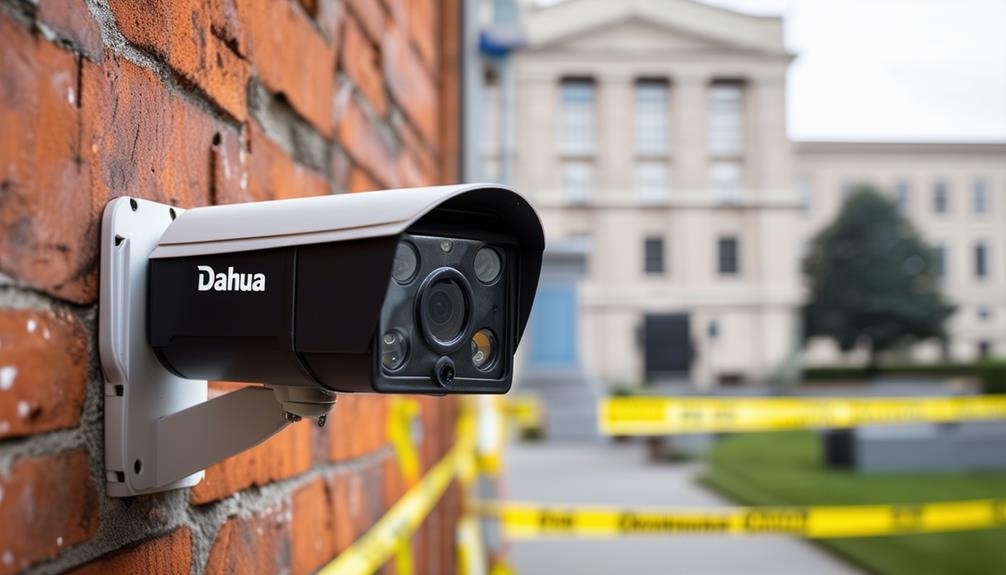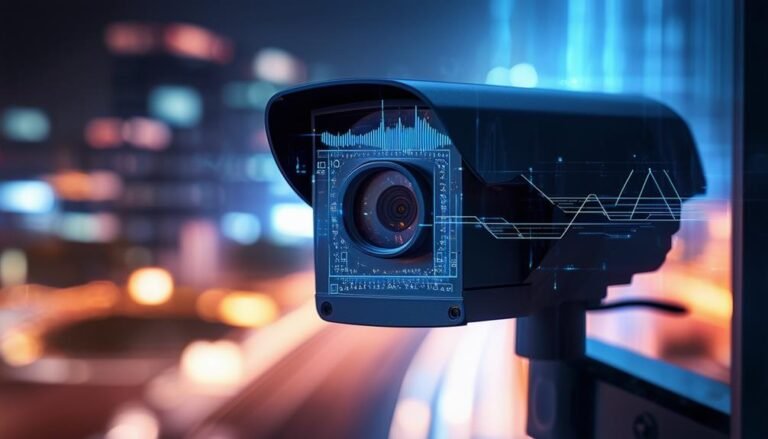Dahua cameras aren’t outright banned, but their use is heavily restricted, especially in the U.S. government sectors due to privacy and security concerns. Federal agencies, like the Department of Defense, have limitations on purchasing these devices. In Europe and other countries, bans are becoming more common due to human rights issues and surveillance risks. While businesses and private users might have more freedom, there’s significant public skepticism and potential backlash. If you’re curious about the broader implications, trends, or alternatives in the surveillance market, you might find the next insights particularly enlightening.
Overview of Dahua Cameras
Dahua cameras are often regarded for their advanced technology and affordability, making them a popular choice for both residential and commercial surveillance. When you consider a security solution, Dahua stands out with its wide range of products designed to meet various needs. Whether you’re looking to monitor your home, business, or property, these cameras offer features like high-definition video, night vision, and motion detection.
You’ll appreciate how Dahua integrates smart technology into its devices, allowing for remote access via mobile apps. This means you can check in on your property from anywhere, giving you peace of mind and a sense of control. The user-friendly interfaces make it easy for anyone to navigate the system, regardless of tech-savviness.
Moreover, Dahua’s affordability doesn’t sacrifice quality. You can find reliable options without breaking the bank, making it accessible for just about anyone. The brand’s reputation for durability means you’re investing in a long-term solution that can withstand various environmental conditions.
As you weigh your options, consider how Dahua’s commitment to innovation aligns with your desire for autonomy and security. By choosing their cameras, you’re not just opting for a surveillance tool; you’re embracing a lifestyle where you can safeguard your space freely. Ultimately, Dahua cameras can empower you to take charge of your safety with advanced technology that fits your budget.
Legal Status in the U.S
In recent years, the legal status of Dahua cameras in the U.S. has come under scrutiny due to concerns over privacy and security. These cameras, manufactured by a Chinese company, have been linked to allegations of human rights abuses and government surveillance. As a result, many individuals and organizations have voiced their fears about the implications of using such technology in their communities and workplaces.
While there hasn’t been a nationwide ban on Dahua cameras, various federal agencies have taken steps to restrict their use. The Department of Defense and other government sectors have prohibited the purchase of equipment from Dahua, citing national security risks. This has led to a ripple effect in private sectors, as companies and institutions weigh the potential backlash of employing technology deemed questionable.
You’re not alone if you’re concerned about the integrity of your data and the devices you choose. Transparency and accountability are fundamental in a world where surveillance is becoming more prevalent. The legal landscape is still evolving, and as consumers, you have the power to demand safer alternatives. It’s important to stay informed and make conscious choices that align with your values of freedom and privacy.
As debates continue and regulations shift, keep an eye on developments surrounding the use of Dahua cameras. The conversation around privacy rights and technological ethics is crucial for ensuring that your freedoms remain protected in an increasingly connected world.
Bans in Europe
Countries across Europe have increasingly taken a hard stance against the use of Dahua cameras, driven by similar concerns over privacy and security as seen in the U.S. The debate around these cameras isn’t just about their functionality; it’s about who’s watching you and how that data is being used. As a citizen who values your freedom, it’s vital to understand why these bans are happening.
Here are three key reasons countries are moving to ban Dahua cameras:
- Data Privacy: Many European nations prioritize the protection of personal data. Dahua cameras, linked to surveillance concerns, pose a threat to individual privacy rights.
- Security Risks: There are fears that these cameras could be hacked or exploited, leading to unauthorized surveillance and data breaches. The potential for misuse is a significant concern for citizens wanting to feel secure in their own spaces.
- Political Pressure: With rising tensions between the West and certain foreign governments, European countries are reevaluating their relationships with tech companies like Dahua. These decisions reflect a broader desire to maintain autonomy and protect national interests.
As these bans gain momentum, it’s important to stay informed and engaged. The implications of these decisions extend beyond technology; they touch on your rights and the fundamental principles of freedom. Staying vigilant about privacy and security is vital in today’s world.
Government Actions Worldwide
Many governments around the world are taking decisive action against the use of Dahua cameras, reflecting growing concerns about privacy and security. In the U.S., federal agencies have begun to restrict the procurement of surveillance technologies from companies like Dahua, citing risks related to national security. You might be aware that some states have gone even further, enacting outright bans on the use of these cameras in public spaces. This indicates a broader push for accountability in surveillance practices.
In Canada, federal and provincial governments are also reassessing their relationships with Dahua, urging municipalities to reconsider their existing contracts. You’ll find that this trend isn’t limited to North America. Countries in Asia and Australia are scrutinizing these products, leading to significant discussions about data control and the ethics of surveillance. Australia, for instance, has seen state governments review their policies, calling for a halt on new installations of Dahua cameras in public areas.
The European Union’s actions have set a strong precedent, and other nations are starting to follow suit. By prioritizing privacy and security, governments are sending a clear message: unchecked surveillance isn’t acceptable. As you engage in conversations about these developments, it’s crucial to recognize the importance of holding corporations accountable for their technology. With every ban or restriction, we’re taking steps toward safeguarding our freedoms and ensuring that surveillance serves the public interest rather than undermining it. Your voice matters in this ongoing dialogue about privacy and technology.
Human Rights Concerns
Amid growing global scrutiny, human rights concerns surrounding the use of Dahua cameras have come to the forefront. These concerns aren’t just about surveillance; they’re about the implications such technology has on your freedoms and rights. As you navigate an increasingly monitored world, it’s essential to reflect on the potential impact of these cameras on civil liberties.
Here are three pressing human rights concerns related to Dahua cameras:
- Privacy Invasion: These cameras can monitor individuals without their consent, leading to a significant invasion of personal privacy.
- Suppression of Dissent: In regimes where Dahua cameras are deployed, there’s a risk that they could be used to stifle dissent, targeting activists and protesters who simply want to voice their opinions.
- Lack of Accountability: Often, there’s insufficient oversight regarding how footage is used or stored, raising questions about who’s watching you and for what purpose.
As you reflect on the implications of surveillance technology, think about how these cameras could affect your right to move freely and express yourself. The use of Dahua surveillance systems can create an atmosphere of fear, where individuals feel they’re constantly being watched. This isn’t just a technological issue; it’s a human rights issue that affects everyone’s ability to live freely and authentically. You deserve to feel safe and empowered in your own environment, and it’s important to remain vigilant about the tools that could undercut those freedoms.
Security Risks and Allegations
When it comes to the security risks associated with Dahua cameras, concerns extend beyond just privacy. Many people have raised alarms about the potential for unauthorized access and data breaches. If you’re using Dahua cameras, you might want to reflect on what could happen if malicious actors exploit vulnerabilities in the system. Reports have surfaced indicating that these cameras may have weak security protocols, making it easier for hackers to gain control and access sensitive footage.
Moreover, there’s the issue of data handling. Dahua has faced allegations of sharing user data with third parties, raising red flags about how your information is managed. You trust these devices to keep your space secure, but if the data is mishandled, it defeats the purpose of having a surveillance system in the first place.
Then there’s the geopolitical aspect; Dahua is linked to the Chinese government, which has led to suspicions about potential surveillance on users outside of China. You might be asking yourself whether your own security is compromised simply by using these cameras.
It’s essential to weigh these risks against your need for surveillance. While Dahua cameras may offer competitive features, the potential security threats could undermine your safety and privacy. In a world where freedom and security should coexist, it’s vital to be informed and vigilant about the devices you choose to integrate into your life.
Alternatives to Dahua Cameras
If you’re looking for alternatives to Dahua cameras, there are several top competitor brands worth considering. Think about key features like resolution, night vision, and ease of use to find the right fit for your needs. Let’s explore some of the best options available on the market today.
Top Competitor Brands
In the domain of surveillance technology, several brands stand out as strong alternatives to Dahua cameras. If you’re looking for options that offer robust features and reliability, consider these top competitors:
1. Hikvision
Known for its extensive range of cameras, Hikvision provides high-quality imaging and a variety of models suited for different environments.
2. Axis Communications
Axis is a pioneer in network cameras, focusing on innovation and quality. Their products are often recognized for superior performance and user-friendly interfaces.
3. Amcrest
Amcrest offers a solid selection of security cameras that balance affordability with advanced features, making them an appealing choice for those who value both price and performance.
Exploring these alternatives can empower you to make informed decisions about your surveillance needs. Each brand has unique strengths, so you can find the perfect fit for your specific requirements. Embracing freedom in your choice lets you take control of your security setup, ensuring it meets your expectations without compromise.
Key Features to Consider
Choosing the right surveillance camera involves considering several key features that can greatly impact performance and usability. It’s crucial to evaluate aspects like resolution, night vision capabilities, and storage options to guarantee you’re getting the best for your needs.
Here’s a quick comparison of some important features to keep in mind:
| Feature | Description |
|---|---|
| Resolution | Higher resolution offers clearer images. |
| Night Vision | Vital for low-light conditions. |
| Storage Options | Local vs. cloud storage can impact access. |
Additionally, consider the camera’s connectivity options. Wi-Fi enabled cameras provide flexibility, but wired cameras often offer more reliability. Look for user-friendly interfaces and mobile app compatibility, as these can make monitoring your property easier.
Lastly, think about the overall design and durability—especially if it’s going to be installed outdoors. By focusing on these features, you can find an alternative to Dahua cameras that suits your surveillance needs while safeguarding your freedom and security.
Public Sentiment and Perception
Many people are increasingly concerned about the implications of banning Dahua cameras, especially regarding privacy and security. This issue isn’t just about surveillance; it’s about how we view technology in our daily lives and the freedoms we hold dear. As debates rage on, you might find yourself wondering how the public perceives this ban and its broader impact.
- Trust in Technology: With growing skepticism around surveillance tools, many question whether they can trust any technology, including Dahua cameras, to safeguard their privacy.
- Fear of Overreach: A significant portion of the public worries that banning these cameras could lead to government overreach or the erosion of personal freedoms. When you consider the implications, it’s about more than just one brand; it’s about the principle of choice and autonomy.
- Desire for Alternatives: There’s a prevailing sentiment that if Dahua cameras are banned, people want to guarantee robust alternatives are available. They don’t just want to comply with restrictions; they demand options that respect their privacy and security.
Ultimately, public sentiment reflects a desire for a balanced approach, where technology is embraced for its benefits without sacrificing individual rights. As you navigate these discussions, remember that it’s not just about banning a product; it’s about shaping a future where your freedom is respected and protected.
Implications for Businesses
The ban on Dahua cameras sends ripples through the business landscape, affecting security strategies and operational choices. If you’re a business owner, you need to rethink your surveillance systems, as relying on these cameras could lead to compliance issues or reputational risks. The implications are significant—not just regarding replacing hardware but also in re-evaluating your overall security framework.
You might find yourself needing to invest in alternative brands, which could lead to unexpected costs and disruptions. This shift could affect not only your budget but also your operational efficiency. Upgrading to new systems often involves time-consuming installations and training for your staff, and these tasks can distract from your core business objectives.
Moreover, the ban highlights a growing trend toward prioritizing privacy and data security, and your customers are likely to take notice. They want to confirm their information is handled responsibly. By choosing compliant systems, you demonstrate your commitment to ethical practices, potentially enhancing your brand’s reputation.
It’s also vital to stay informed about the evolving regulations surrounding security technologies. Adapting to these changes can position your business as a leader in responsible surveillance practices, appealing to clients who value transparency and security.
Ultimately, you must act swiftly and strategically. The ban on Dahua cameras can serve as a catalyst for positive change, pushing you to adopt solutions that align with your values and those of your customers.
Future of Dahua Cameras
Dahua cameras face an uncertain future in a market that’s increasingly sensitive to security and privacy concerns. As you navigate the landscape of surveillance technology, you’ll want to keep an eye on several key factors that could dictate the future of these devices. The conversation around privacy isn’t just a trend—it’s becoming a cornerstone of consumer choice.
Here are three critical factors for you to reflect on:
- Regulatory Changes: Governments worldwide are tightening regulations on surveillance technologies. You’ll need to stay informed about any new laws that could impact the use of Dahua cameras.
- Public Perception: With growing awareness about data privacy, consumer attitudes are shifting. If Dahua can’t address these concerns effectively, it might struggle to maintain its market share.
- Technological Advancements: The industry is evolving rapidly. If Dahua fails to innovate and keep pace with competitors, it risks being sidelined in favor of brands that prioritize both security and privacy.
In this era where freedom and privacy are paramount, you’ve got to make informed decisions about the tools you use. Whether you’re a business owner or a consumer, be sure to contemplate the implications of your choices. The future of Dahua cameras hinges on how well they adapt to these growing concerns. So, stay vigilant and choose wisely—it’s your right to demand accountability in technology.
Frequently Asked Questions
What Are the Key Features of Dahua Cameras?
When considering Dahua cameras, you’ll find several key features that stand out. They offer high-resolution imaging, often up to 4K, ensuring clear visuals. You’ll appreciate their advanced night vision, which provides quality footage even in low light. Many models include smart analytics, helping you detect motion or recognize faces. Plus, their weather-resistant designs make them suitable for outdoor use. Overall, Dahua cameras deliver reliable performance for your security needs.
How Do Dahua Cameras Compare to Competitors?
When you compare Dahua cameras to competitors, you’ll find they offer a solid mix of affordability and advanced features. Their image quality is impressive, often rivaling pricier brands. You’ll appreciate their user-friendly interfaces and extensive range of options, from basic models to sophisticated systems. While some competitors may excel in specific areas, Dahua’s overall value for money and reliability make them a popular choice for those seeking effective surveillance solutions.
Can Dahua Cameras Be Used for Home Security?
Absolutely, you can use Dahua cameras for home security. They offer high-resolution video, night vision, and smart features like motion detection, which help keep your property safe. Plus, their user-friendly interface makes it easy for you to monitor your home remotely. However, it’s crucial to take into account privacy and security implications when choosing your equipment. Overall, if you value reliable surveillance, Dahua cameras are a solid option for your home security needs.
What Is the Price Range for Dahua Cameras?
When it comes to Dahua cameras, you’re looking at a wide price range that typically falls between $50 and $500, depending on the model and features. It’s a case of getting what you pay for; higher-end models offer better resolution and advanced features. If you’re keen on enhancing your home security, investing in a quality camera can give you peace of mind and keep your property safe from prying eyes.
Where Can I Purchase Dahua Cameras?
You can purchase Dahua cameras from various online retailers like Amazon, Newegg, or B&H Photo. Local electronics stores may carry them too. If you prefer, check specialized security equipment suppliers for more options. Make certain to compare prices and read reviews to find the best deal. Don’t forget to take into account warranty and support, as it’s important to guarantee you’re covered in case anything goes wrong with your purchase.



